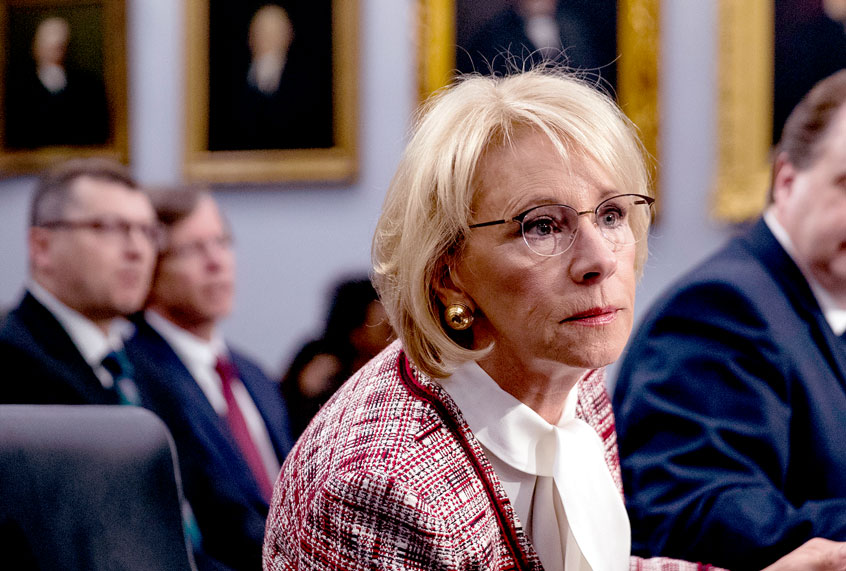Secretary of Education Betsy DeVos came under fire after her department made a bookkeeping change that would result in major funding cuts for America’s rural schools.
The Department of Education quietly informed state education officials that it would change how districts report the number of students who live in poverty, which could result in funding cuts for more than 800 of the “poorest” and “most geographically isolated” schools, according to The New York Times.
The changes to the Rural and Low-Income School Program came after the department found that some districts “erroneously” received funding despite being ineligible. The department previously allowed schools to report the percentage of students who qualify for free or reduced-price lunch, which it used to calculate poverty rates, for nearly two decades. Under the new rule, districts will be required to use data from the Census Bureau’s Small Area Income and Poverty Estimates to determine if they meet the threshold of 20% of students living below the poverty line to qualify for the program.
Education spokeswoman Liz Hill told The Times that the department’s new rule follows existing law, but added that it had “drafted the legislative fix needed to use a free-and-reduced-lunch funding formula.”
“When you discover you’re not following the law Congress wrote, you don’t double down. You fix it,” Hill said. “If that’s what Congress wants, Congress should pass it, and the Education Department will happily implement it. We will also continue to look for ways to help ensure students are not unnecessarily harmed.”
The move stunned rural school leaders, who said they rely on the funding.
“Rural districts have budgeted for these resources, and the administration has given no consideration to how they will be impacted by this immediate cut to their funding,” Sasha Pudelski, the advocacy director at the School Superintendents Association, told The Times.
Some southern states are expected to be hit especially hard. Oklahoma, for example, will likely see the number of schools eligible for the program shrink by half. Matt Holder, the superintendent of Sulphur Public Schools in Oklahoma, said the cuts will force him to cut resources for students in a district where 60% live in poverty.
“It’s important for us to have someone on staff to work with these students and get them where they need to be,” Holder told the outlet. “I feel like we’re cutting from the most vulnerable.”
The move was met with bipartisan criticism. Sen. Lamar Alexander, R-Tenn., the chairman of the committee which oversees education, said he was “very concerned” about the rule change. Alexander vowed to work with Sen. Susan Collins, R-Maine, to “solve this problem for hundreds of rural schools around the country,” a committee spokesperson said in a statement.
“There is no reason that a change was made this year and the Department of Education should listen to Congress and fix this problem quickly,” the statement said.
Collins, one of the authors of the Rural Education Achievement Program, said in a letter to DeVos that 100 of the 149 Maine schools that qualified for the program would lose funding, which would result in about $1.2 million in cuts.
“If this decision is not reversed,” Collins said, “the department risks denying thousands of students living in rural Maine the chance to reach their full potentials.”
Sen. Jon Tester, D-Mont., wrote to DeVos that impoverished school districts would lose $400,000 from the rule change.
“The department should be focusing on elevating school districts with the fewest resources instead of punishing small schools with harmful, last-minute policy changes,” Tester said.
The funding cuts come as rural schools struggle to stay afloat. The nonpartisan advocacy group Rural School and Community Trust issued a report warning that many of these districts “face nothing less than an emergency.”
“Many rural students are largely invisible to state policymakers, because they live in states where education policy is dominated by highly visible urban problems,” the report said.
Alan Richard, a board member of the group, shared his hope with The Times that the Trump administration would focus on rural issues because rural voters played such a large part in his election.
“Rural education advocates definitely hoped that a president elected, in part, because of rural and small-town voters would pay more attention to rural children,” he said. “Even after the last election, with all the attention to rural America, little has been done to correct the inequity so many rural students face.”
“This is wrong,” Sen. Amy Klobuchar, D-Minn., one of the remaining Democratic presidential candidates, tweeted.
Former Democratic presidential candidate Tom Steyer added that the move was an example of Trump’s “war on America’s rural communities.”
“First, it was the tariffs that hurt farmers, now he’s targeting students in rural school districts,” he wrote.
“Providing a quality public school education is one of government’s biggest responsibilities. With this decision, Trump and DeVos earn yet another ‘F,'” said Rep. Carolyn Maloney, D-N.Y., the chairwoman of the House Oversight Committee, adding that the move was particularly suspicious because Trump is “also doing everything in his power to undermine he accuracy of the 2020 census.”

